
6 Most Popular Open Source Headless Commerce Platforms for 2025
Planning to revolutionize your e-commerce venture by embracing the latest trends?
Want to stay ahead of the curve and leverage the most innovative solutions? Wondering how to adapt to the rapidly changing landscape of online retail?
The answer is simple!
You need to explore the world of Open Source Headless Commerce Platforms.
But why, you ask? Why is 2025 the year to make this strategic move, and what exactly does “headless commerce” even mean?
You’re in the right place, and you certainly are interested! Right?
So buckle up, and let’s dive into the fascinating world of headless commerce, the rise of open source platforms, and why staying updated is more crucial than ever.
Understanding Headless Commerce

What is Headless Commerce?
Ever heard of a chicken running around without its head? Well, headless commerce isn’t quite as chaotic, but it’s just as intriguing.
Imagine the “head” as the front-end of your online store, where customers browse and shop. Now, detach that head, and what do you have?
A system where the back-end (the body) operates independently from the front-end (the head).
In simpler terms, headless commerce is a separation of the front-end and back-end of an e-commerce platform.
This separation allows developers to work on the back-end without affecting the user experience on the front-end. It’s like having a kitchen that can change its menu without disrupting the dining room.
The Architecture of Headless Commerce
The architecture of headless commerce is like a well-orchestrated symphony. The front-end, or the “presentation layer,” communicates with the back-end through APIs (Application Programming Interfaces). This separation allows for:
- Flexibility: Change one part without affecting the other.
- Scalability: Grow your business without technological constraints.
- Customization: Tailor the user experience to your brand’s unique needs.
It’s like building a house with interchangeable rooms. Want to change the kitchen? No problem, the living room stays intact!
Benefits of Headless Commerce
Headless commerce is not just a buzzword; it’s a strategic advantage. Here’s why:
- Faster Time to Market: Launch products and campaigns without back-end delays.
- Enhanced User Experience: Create personalized and dynamic content.
- Omnichannel Capability: Seamlessly integrate with various platforms and devices.
- Cost-Effective: Reduce development time and resources.
It’s like having a Swiss Army knife for your e-commerce needs!
Potential Drawbacks and Challenges
But wait, is headless commerce a silver bullet? Not quite. Here are some potential drawbacks:
- Complexity: Requires skilled developers and understanding of APIs.
- Integration Challenges: Not all third-party tools may be compatible.
- Initial Costs: Upfront investment in development and infrastructure.
It’s not a one-size-fits-all solution, but for many, the benefits outweigh the challenges.
The Open Source Revolution

Defining Open Source Software
Open source is like a community garden where everyone can plant, water, and harvest.
It’s software where the source code is available to anyone. Want to tweak something? Go ahead! It’s all about collaboration, innovation, and freedom.
The Impact of Open Source on E-commerce
Open source is shaking up the e-commerce world like a smoothie blender mixing fresh ingredients. It’s allowing businesses to:
- Adapt Quickly: Modify the code to meet changing market demands.
- Reduce Costs: No licensing fees, just community-driven innovation.
- Enhance Security: Continuous updates and community oversight.
It’s like having a team of global experts working on your store, for free!
Advantages of Open Source Platforms
Open source platforms are like a treasure trove of opportunities. They offer:
- Customization: Tailor every aspect of your store.
- Community Support: Access to a vast network of developers and enthusiasts.
- Transparency: Know exactly what’s happening under the hood.
It’s like having a car where you can see and tweak every part of the engine.
Possible Limitations of Open Source Platforms
But hold on, it’s not all sunshine and rainbows. Open source platforms can have:
- Compatibility Issues: Not all tools and plugins may work together.
- Steep Learning Curve: Requires technical know-how.
- Potential Lack of Support: Community support may vary.
It’s like cooking a gourmet meal; it’s rewarding but requires skill and the right ingredients.
The 6 Most Popular Open Source Headless Commerce Platforms
1. Bagisto: A New Wave in E-commerce
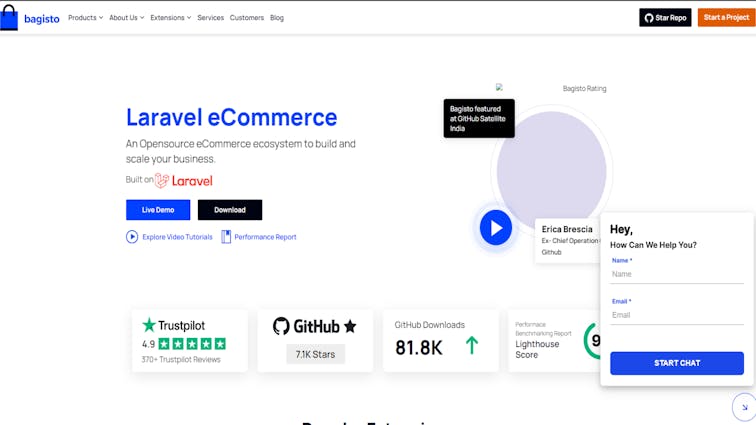
Bagisto is an open-source e-commerce platform built on Laravel, one of the most popular PHP-based frameworks available today.
With a focus on flexibility, customization, and community-driven innovation, Bagisto has empowered over 25,000 companies globally, enabling them to effectively establish and expand their online enterprises.
Features
- Multi-Tenant SaaS: A single instance software supporting infrastructure that serves multiple customers.
- Marketplace Integration: Scale up your business by increasing workload in a cost-effective manner.
- Progressive Web Application: Modern web capabilities to deliver an app-like user experience.
- Point of Sales System: Designed to keep track of all sales orders and customer profile management.
- B2B Platform: Features to ensure modern online experiences for business-to-business transactions.
- Laravel Mobile App Integration: Powers countless sites, web apps, and enterprise systems.
Pros
- Customization: Tailor every aspect of your store with access to source code.
- Community Support: A vast network of developers and enthusiasts.
- Cost-Effective: No licensing fees, with continuous updates and community oversight.
- High-Quality Design: Attention to detail and functionality.
Cons
- Compatibility Issues: Not all tools and plugins may work together.
- Steep Learning Curve: Requires technical know-how.
- Potential Lack of Support: Community support may vary.
Bagisto’s unique approach to open-source e-commerce solutions, coupled with a strong support team, makes it an attractive option for businesses looking to grow and innovate.
2. Adobe Magento: The Powerhouse of E-commerce
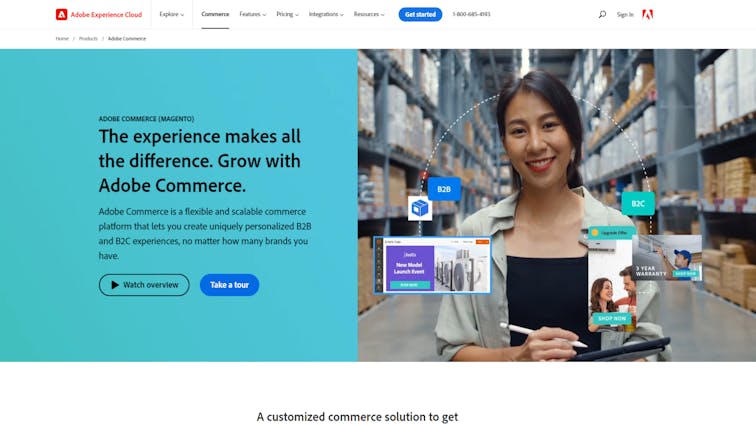
Magento, now known as Adobe Commerce, is a robust and scalable commerce platform that has become synonymous with e-commerce innovation.
With its ability to create uniquely personalized B2B and B2C experiences, Magento has been a go-to solution for businesses of all sizes, from small startups to global brands.
Features
- Native AI Integration: Utilizes AI to deliver personalized site search, product recommendations, and browsing experiences.
- B2B & B2C Capabilities: A unified platform catering to both business models.
- Platform Architecture: High-performance foundation with out-of-the-box composable services.
- Scalable Operations: Adapts and grows with your business needs.
- Adobe Integrations: Seamlessly integrates with other Adobe products.
- Commerce Marketplace: Thousands of free and premium apps and extensions for customization.
Pros
- Flexibility: Offers a wide range of customization options.
- Omnichannel Personalization: Utilizes AI and machine learning for personalized content and promotions.
- Global Reach: Increases reach to new markets, brands, or business models.
- User-Friendly Tools: Business-specific tools with AI to boost marketing and merchandising.
Cons
- Complexity: Can be challenging to set up and manage without technical expertise.
- Cost: The premium version can be expensive for small businesses.
- Potential Compatibility Issues: Some third-party integrations may require additional customization.
Magento’s reputation as a leader in digital commerce is well-earned, with a proven track record of increasing conversion rates and traffic for global brands.
Its flexibility and scalability make it a preferred choice for businesses looking to grow and innovate.
3. Saleor: The Developer’s Dream
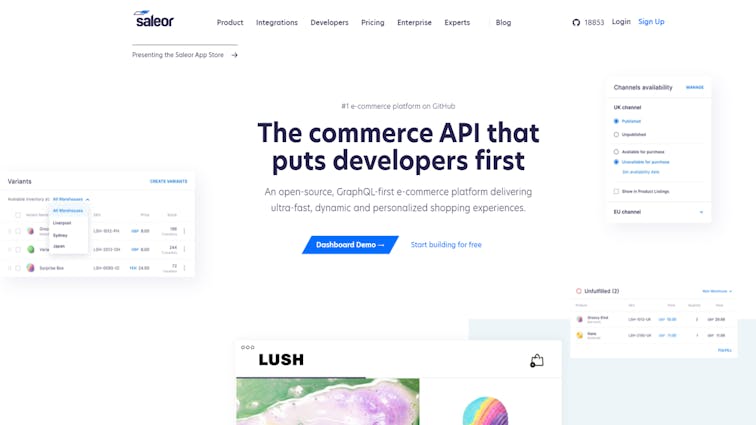
Saleor is a headless, GraphQL-first e-commerce platform that’s designed to deliver ultra-fast, dynamic, and personalized shopping experiences.
Recognized as the #1 e-commerce platform on GitHub, Saleor is built with developers in mind, offering a flexible and complete commerce API that can integrate with various CMS, CRM, fulfillment APIs, PIM, POS, ERP, and more.
Features
- Truly Omni-Channel: Offers a finely-crafted, extremely flexible, and complete commerce API.
- Global by Design: Multi-channel, multi-warehouse, multi-language, and multi-currency enable frictionless expansion.
- Radical Frontend Flexibility: Decouples the presentation layer from the core business, allowing for beautiful, engaging brand experiences.
- Made for Developers: Utilizes modern front-end tools like GraphQL, JAMstack, Next.js, and offers powerful extensions through Webhooks/PubSub.
- Zero DevOps, Zero Maintenance: Takes care of scaling, updating, and securing the infrastructure.
- GDPR Compliance: Control where your data is stored with data centers available in both the US and EU.
Pros
- Developer-Friendly: Offers the fastest-growing open-source e-commerce platform with modern tools.
- Frontend Flexibility: Manage any number of storefronts, apps, and devices from a single back-end.
- Global Reach: Designed to power fast-growing e-commerce brands worldwide.
- Cost-Effective: Pricing model depends on resource use, allowing growth to go directly to your bottom line.
Cons
- Complexity for Non-Developers: May require a steep learning curve for those without technical expertise.
- Integration Challenges: Some third-party tools may require additional customization.
- Potential Lack of Support: Community support may vary depending on the complexity of the issue.
Saleor’s commitment to providing a developer-first environment, coupled with its global design and frontend flexibility, makes it a compelling choice for businesses looking to create engaging and personalized shopping experiences.
4. WooCommerce: The E-commerce Platform That Grows with You
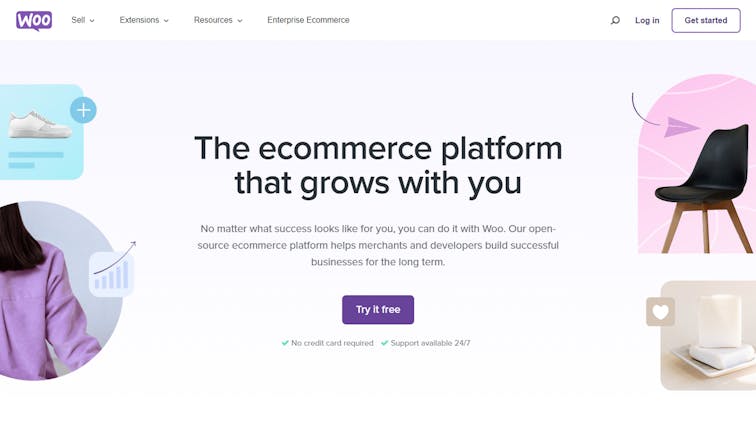
WooCommerce is a customizable, open-source e-commerce platform built on WordPress. With a focus on long-term growth, WooCommerce offers solutions for merchants and developers alike, whether you’re launching a new online store or building powerful e-commerce solutions.
Loved by millions of brands, WooCommerce is trusted by 3.9 million online stores and powers 23% of the top 1 million e-commerce sites.
Features
- Woo Express: Offers everything you need to launch a store quickly and keep it growing.
- Payments: Accept and manage transactions right from your dashboard with WooPayments.
- Shipping: Save time and money with WooCommerce Shipping.
- Custom Solutions for High-Volume Stores: Advanced selling features and dedicated support for established merchants.
- Extensibility: WooCommerce’s greatest strength, allowing for fine-tuned customization.
- Integration with WordPress: 43% of the web is built on WordPress, and WooCommerce seamlessly integrates with it.
Pros
- Flexibility: Start for free and grow your store without giving away a portion of your profits.
- Customization: Next-level customization to help established merchants continue growing.
- Global Reach: Trusted by millions of brands worldwide.
- Community Support: A vast network of developers and enthusiasts.
Cons
- Complexity for Non-Developers: May require technical expertise for customization.
- Integration Challenges: Compatibility with certain third-party tools may vary.
- Potential Costs: While starting is free, some extensions and themes may incur costs.
WooCommerce’s adaptability, coupled with its integration with WordPress, makes it a preferred choice for businesses looking to grow organically and innovate. Its open-source nature and community-driven approach ensure that you have the tools and support needed to succeed.
5. Sylius: The Future-Ready E-commerce Platform
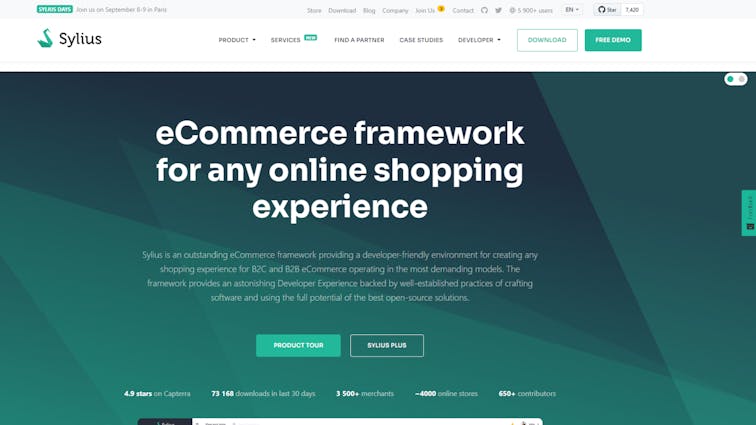
Sylius is an Open Source Headless eCommerce Platform designed for mid-market and enterprise brands that require custom solutions.
With a modern approach to professional development, Sylius allows the evolution of your digital stack at a pace that outperforms competitors and delivers the experience your customers deserve.
It’s a platform that’s ready for headless commerce and progressive web applications (PWAs), ensuring agility and customizability.
Features
- Powerful APIs for Headless Commerce: Sylius comes with a robust REST API that can be customized to integrate with various frontends or microservices.
- Easy to Host & Scale: Adapts to your evolving needs, from standard VPS to scalable stacks on cloud providers.
- Quality Standards and No Technical Debt: Ensures an evolutionary approach with the highest quality standards.
- Tested & Testable: Pioneers in automated testing of eCommerce platforms, focusing on business value.
- Integration with Top Brands: Trusted by leading brands for its agility in advancing and improving online stores.
Pros
- Agility & Customizability: Designed for flexibility, allowing for quick adaptation to market changes.
- Scalability: Plays well with Docker and Kubernetes, ensuring optimal costs on cloud providers.
- Quality Assurance: Encodes automated testing in your projects, detecting and fixing problems before they affect customers.
- Community Support: Recognized as the best eCommerce platform by a community of top industry players and developers.
Cons
- Complexity for Non-Developers: May require technical expertise for customization.
- Integration Challenges: Compatibility with certain third-party tools may vary.
- Potential Costs: While offering optimal scalability, some extensions and themes may incur costs.
Sylius’s commitment to quality standards, coupled with its readiness for headless commerce and PWAs, makes it a compelling choice for businesses looking to stay ahead of the curve and deliver exceptional customer experiences.
6. Spree Commerce: Unlocking Limitless Customization
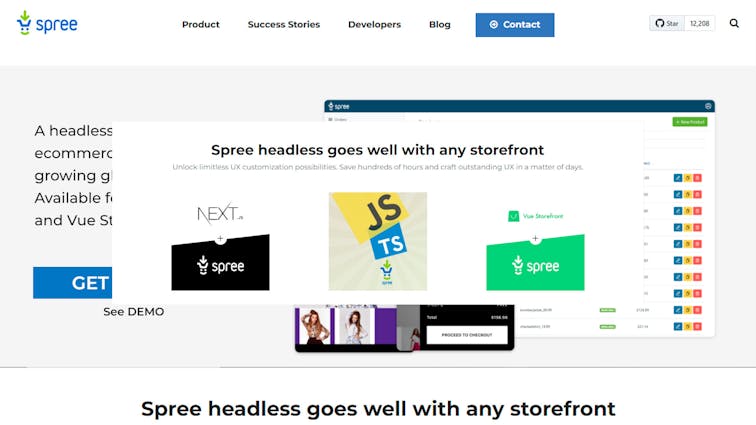
Spree Commerce is a headless open-source e-commerce platform that goes well with any storefront, unlocking limitless UX customization possibilities.
With pre-built integrations like Next.js Commerce, Javascript/TypeScript SDK, and Vue Storefront 2, Spree Commerce offers a versatile platform for single or multiple brands, multi-language and multi-currency support, and limitless storefront customization.
Features
- Multi-Brand Support: Single brand or multiple brands, multi-language, and multi-currency.
- Integration with Popular Frontends: Next.js Commerce, Javascript/TypeScript SDK, Vue Storefront 2.
- Modern API with Pre-Built SDKs: Ensures seamless integration with various frontends.
- Runs Anywhere: Offers flexibility in hosting and scaling.
- Accessibility Compliance: Follows WCAG 2.1 AA guidelines for a user-friendly experience.
- Responsive Admin Panel UI: Manage your e-commerce business on any device.
Pros
- Limitless Customization: Offers a wide range of customization options for unique UX.
- Global Reach: Multi-language and multi-currency support for a global audience.
- Integration Flexibility: Connect to any 3rd party service directly or using various tools.
- Community Support: A thriving community of contributors and developers.
Cons
- Complexity for Non-Developers: May require technical expertise for customization.
- Integration Challenges: Compatibility with certain third-party tools may vary.
- Potential Costs: Some extensions and themes may incur costs.
Spree Commerce’s commitment to limitless customization and its modern approach to e-commerce makes it a compelling choice for businesses looking to create a unique and engaging shopping experience. Its open, community-powered project ensures that you have the support and tools needed to succeed.
Choosing the Right Platform for Your Business
The selection of an Open Source Headless Commerce Platform is a critical decision that can shape the future of your online business.
The right platform can enhance your reach, improve customer experience, and drive growth. Here’s how to make the best choice:
Assessing Your Business Needs
- Understanding Your Audience: Who are your customers? What are their preferences? Understanding your target audience can guide you in selecting a platform that offers the features and customization they desire.
- Identifying Key Features: What specific functionalities do you need? From multi-language support to seamless integrations, list down the essential features that align with your business goals.
- Budget Considerations: Open source doesn’t always mean free. Consider potential costs for extensions, themes, and support.
- Technical Expertise: Assess the technical skills of your team. Some platforms may require more technical know-how than others.
Matching Platforms to Business Types
- For Startups and Small Businesses: Platforms like WooCommerce might be suitable for those looking for cost-effective solutions with room for growth.
- For Mid-Market and Enterprise Brands: Platforms like Sylius and Saleor offer robust features and scalability for businesses aiming for global reach.
- For Unique Customization Needs: If your business requires limitless customization, Spree Commerce might be the right choice.
Considerations for Future Scalability
- Adaptability: Choose a platform that can adapt to changing market trends and customer behaviors.
- Integration with Future Technologies: Consider how easily the platform can integrate with emerging technologies like AI, VR, or new payment methods.
- Community and Support: A platform with strong community support ensures that you’ll have access to updates, extensions, and assistance as your business grows.
- Performance Metrics: Consider platforms that offer tools to monitor and analyze performance, helping you make data-driven decisions for future growth.
Conclusion:
To ensure your ecommerce success, it’s crucial to choose a platform that meets your business’s unique needs and future goals.
Open-source headless commerce platforms like WooCommerce, Sylius, Saleor, and Spree Commerce, among others, offer powerful features, flexibility, and immense customization possibilities.
Additionally, their vibrant community support ensures constant updates, assistance, and discussion among users and developers globally.
With careful considerations of your business needs, technical expertise of the team, and a future growth plan, you can select an unsinkable ship to navigate the ever-changing ecommerce waters.
The journey might be challenging, but the rewards are plentiful and fulfilling. Best of Luck!
FAQ’s
1. What is open-source ecommerce?
Open-source ecommerce refers to online retail platforms whose source code is made publicly available. This means that anyone can view, modify, and distribute the software for free. Open-source ecommerce solutions offer flexibility, scalability, and customization, allowing businesses to create unique online shopping experiences tailored to their needs.
2. What is the best open-source B2B ecommerce platform?
The best open-source B2B ecommerce platform can vary based on specific business needs and preferences. However, some popular choices include Magento, PrestaShop, and WooCommerce. These platforms are known for their robust features, scalability, and extensive community support, making them suitable for B2B operations.
3. Which e-commerce model is most profitable?
The profitability of an e-commerce model depends on various factors like target audience, market demand, and operational efficiency. However, some of the most profitable e-commerce models include:
- Dropshipping: Where retailers don’t keep products in stock but instead transfer customer orders to a third-party supplier.
- Private Labeling and Manufacturing: Where businesses produce their own branded products.
- Subscription-based Models: Where customers pay a recurring fee to access products or services.
It’s essential to research and analyze the market to determine which model is most suitable for a specific business.
4. What are the advantages of open-source e-commerce?
Open-source e-commerce platforms offer several advantages, including:
- Customization: Businesses can tailor the platform to their specific needs, ensuring a unique and optimized shopping experience for their customers.
- Cost-Effective: Since open-source platforms are typically free to use, businesses can save on initial setup costs.
- Community Support: Open-source platforms often have large communities that offer support, plugins, and extensions, enhancing the platform’s capabilities.
- Flexibility: Open-source solutions are not tied to a specific hosting provider or platform, giving businesses the freedom to choose where and how they operate their online store.








